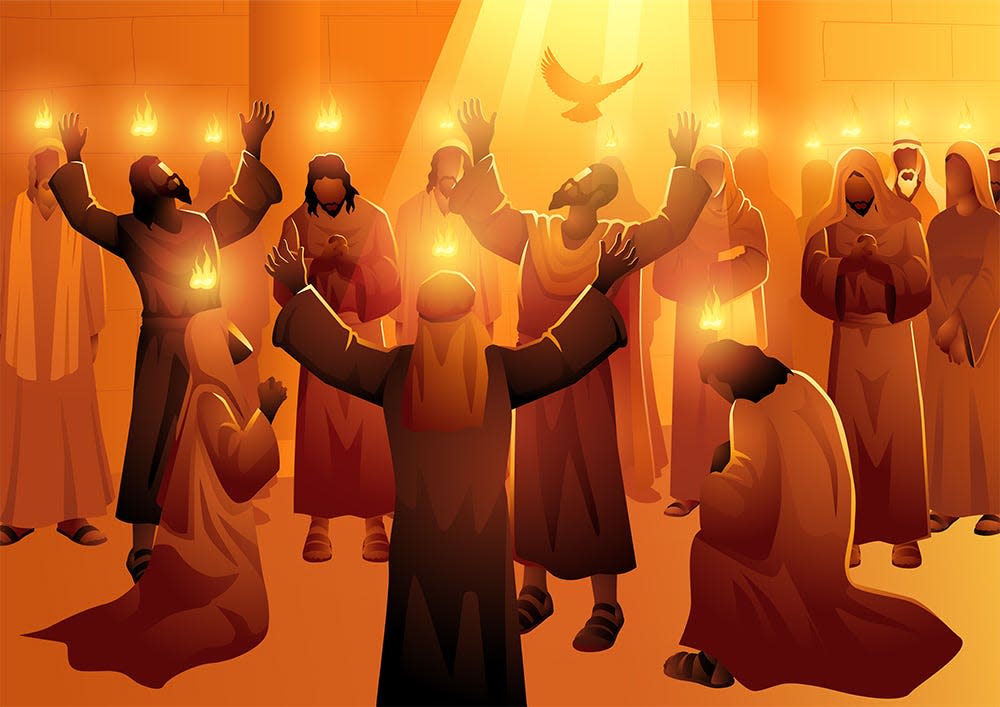Christians are divided despite a shared language. Just ask Harrison Butker and the Sisters of St. Scholastica

Editor's note: As part of our commitment to foster civil conversations in Viewpoints, we're inviting faith leaders to submit edited versions of their homilies that transcend religion, with messages that can appeal to people of all faith traditions.
A few weeks ago, many in the Christian tradition celebrated Pentecost, a story found in Acts 2, often called the birthday of the Church. On that day, people from dozens of places were, “filled with the Holy Spirit and began to speak in other languages, as the Spirit gave them ability.”
Scholars think this is a call-back to the story of the Tower of Babel in Genesis, which begins with everyone speaking the same language, but ends with the ominous line: “Therefore it was called Babel, because there the Lord confused the language of all the earth.” What happened at Babel divided people through different languages, resulting in misunderstanding, rivalries and conflict. But Pentecost, it is said, was the beginning of the reunification of humanity.
Fast forward a few thousand years, and we have a slightly different problem. Theologian Marcus Borg explains, “Christians in this country (and elsewhere) are deeply divided by different understandings of a shared language. ... The differences are so sharp that they virtually produce two different religions, both using the same Bible and the same language.”
This was clear when Harrison Butker, kicker for an NFL team, gave the commencement speech at Benedictine College, in which he rebuked President Joe Biden as a Catholic who supports abortion rights and urged women to forgo careers so they could become fulltime homemakers. He closed with, “Never be afraid to profess the one holy, Catholic, and apostolic Church. ... I believe this audience and this venue is the best place to speak openly and honestly about who we are and where we all want to go, which is Heaven.”
Responses to this included everything from full-throated endorsements to calls for the end of his career.
Then, the Sisters of St. Scholastica entered the chat. They did not believe Butker’s comments accurately represented Catholic or Benedictine beliefs. In an open letter they wrote: “Our community has taught young women and men not just how to be 'homemakers' in a limited sense, but rather how to make a Gospel-centered, compassionate home within themselves where they can welcome others as Christ. ... We reject a narrow definition of what it means to be Catholic. ... We want to be known as an inclusive, welcoming community. ... With St. Benedict, we pray, “Let us prefer nothing whatever to Christ, and may he lead us all together to life everlasting.”
More: Women don’t need a ‘Bill of Rights’ to define gender. We need policies that improve our outcomes.
Despite using shared language, the difference in Butker’s and the Sisters’ understanding of faithful living is plain. Some suggest that we return to the days of Babel, separating into communities of only the like-minded. Butkerites should all live together, and the rest of us will abide with the sisters and others like them. Permanently distancing ourselves from those we disagree with is a popular plan with folks on both ends of the spectrum.
But scripture suggests another approach. Acts 2 opens with, “When the day of Pentecost had come, they were all together in one place.” As in, before they understood one another, they were in proximity. Despite the early believers’ disagreements about who was in and who was out, they hadn’t yet retreated into separate corners. Apparently, this was enough of an opening for the Spirit to nudge them toward understanding.
The question is whether we will insist on staying close enough for shared understanding to still be a possibility? Will those who believe in extravagant welcome and the common good refuse to write-off those who “speak Christian” but in ways we cannot comprehend? We must remember that “We all live in the same house,” as the honorable Rep. John Lewis once said.
To take the story of Pentecost seriously, we must commit to leaving the window cracked. That’s all the room the Spirit needs to make her move. Happy Pentecost, Church. Still.

The Rev. Lori Allen Walke is senior minister at Mayflower Congregational United Church of Christ.
This article originally appeared on Oklahoman: Harrison Butker, Sisters have different understanding on same language

